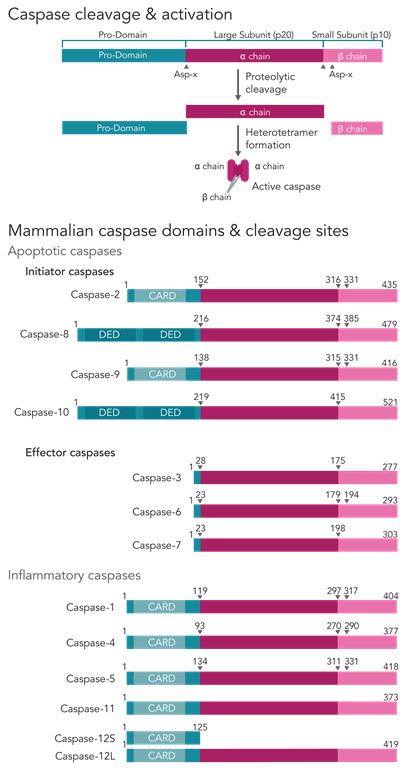The role of caspases in apoptosis
Capases are members of the family of cysteine proteases, and are involved in the process of programmed cell death known as apoptosis
These proteins are highly regulated and under steady-state conditions caspases are present as inactive monomeric proenzymes, activation is triggered by dimerization and often proteolytic processing at defined sites.
Initiator caspases activate executioner caspases which are involved in the coordinated destruction of key cellular structures.

Caspase in immune response
In addition to their role in apoptosis, caspases 1, 4, 5 and 12 in humans also function in innate immune responses.
Caspase activity has been implicated in human disease both through defective activation and inadequate cell death in cancer and excessive activation in neurodegenerative diseases.
In the immune system hyper activation during inflammation can lead to inflammatory conditions while insufficient activation can lead to an increased susceptibility to infections.
Explore our popular knockout cell lines for caspase
| CASP2 | CASP3 | CASP6 |
| CASP7 | CASP8 | CASP9 |
Order products
Human knockout HAP-1 cells
The single largest bank of isogenic cell lines with over 7,500 cell lines to choose from and trusted by academia, biotech, and pharma research labs.
Cancer-related cell lines
Choose from over 300 knock-in and knockout cell line models in many standard cancer cell lines such as DLD1, MCF10A, and HCT116.
Cas9 Stable Cell Lines
Simplify gene editing experiments with stably expressing Cas9 cell lines
CRISPRmod CRISPRa dCas9-VPR Stable Cell Lines
Streamline CRISPR activation experiments with stably expressing dCas9-VPR cell lines
